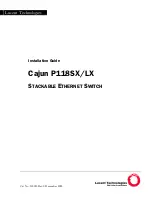
IP Fragment Handling
Dell Networking OS supports a configurable option to explicitly deny IP fragmented packets, particularly second and subsequent packets.
It extends the existing ACL command syntax with the
fragments
keyword for all Layer 3 rules applicable to all Layer protocols (permit/
deny ip/tcp/udp/icmp).
•
Both standard and extended ACLs support IP fragments.
•
Second and subsequent fragments are allowed because a Layer 4 rule cannot be applied to these fragments. If the packet is to be
denied eventually, the first fragment would be denied and hence the packet as a whole cannot be reassembled.
•
Implementing the required rules uses a significant number of CAM entries per TCP/UDP entry.
•
For IP ACL, Dell Networking OS always applies implicit deny. You do not have to configure it.
•
For IP ACL, Dell Networking OS applies implicit permit for second and subsequent fragment just prior to the implicit deny.
•
If you configure an
explicit
deny, the second and subsequent fragments do not hit the implicit permit rule for fragments.
•
Loopback interfaces do not support ACLs using the
IP fragment
option. If you configure an ACL with the
fragments
option and
apply it to a Loopback interface, the command is accepted but the ACL entries are not actually installed the offending rule in CAM.
IP Fragments ACL Examples
The following examples show how you can use ACL commands with the
fragment
keyword to filter fragmented packets.
Example of Permitting All Packets on an Interface
The following configuration permits all packets (both fragmented and non-fragmented) with destination IP 10.1.1.1. The second rule does not
get hit at all.
Dell(conf)#ip access-list extended ABC
Dell(conf-ext-nacl)#permit ip any 10.1.1.1/32
Dell(conf-ext-nacl)#
deny ip any 10.1.1.1/32 fragments
Dell(conf-ext-nacl)
Example of Denying Second and Subsequent Fragments
To deny the second/subsequent fragments, use the same rules in a different order. These ACLs deny all second and subsequent fragments
with destination IP 10.1.1.1 but permit the first fragment and non-fragmented packets with destination IP 10.1.1.1.
Dell(conf)#ip access-list extended ABC
Dell(conf-ext-nacl)#
deny ip any 10.1.1.1/32 fragments
Dell(conf-ext-nacl)#permit ip any 10.1.1.1/32
Dell(conf-ext-nacl)
Layer 4 ACL Rules Examples
The following examples show the ACL commands for Layer 4 packet filtering.
Permit an ACL line with L3 information only, and the
fragments
keyword is present:
If a packet’s L3 information matches the L3
information in the ACL line, the packet's FO is checked.
•
If a packet's FO > 0, the packet is permitted.
•
If a packet's FO = 0, the next ACL entry is processed.
Deny ACL line with L3 information only, and the
fragments
keyword is present:
If a packet's L3 information does match the L3
information in the ACL line, the packet's FO is checked.
•
If a packet's FO > 0, the packet is denied.
•
If a packet's FO = 0, the next ACL line is processed.
120
Access Control Lists (ACLs)
Summary of Contents for S4048T-ON
Page 1: ...Dell Configuration Guide for the S4048 ON System 9 11 2 1 ...
Page 148: ...Figure 10 BFD Three Way Handshake State Changes 148 Bidirectional Forwarding Detection BFD ...
Page 251: ...Dell Control Plane Policing CoPP 251 ...
Page 363: ... RPM Synchronization GARP VLAN Registration Protocol GVRP 363 ...
Page 511: ...Figure 64 Inspecting the LAG Configuration Link Aggregation Control Protocol LACP 511 ...
Page 558: ...Figure 84 Configuring Interfaces for MSDP 558 Multicast Source Discovery Protocol MSDP ...
Page 559: ...Figure 85 Configuring OSPF and BGP for MSDP Multicast Source Discovery Protocol MSDP 559 ...
Page 564: ...Figure 88 MSDP Default Peer Scenario 2 564 Multicast Source Discovery Protocol MSDP ...
Page 565: ...Figure 89 MSDP Default Peer Scenario 3 Multicast Source Discovery Protocol MSDP 565 ...
Page 841: ...Figure 115 Single and Double Tag TPID Match Service Provider Bridging 841 ...
Page 842: ...Figure 116 Single and Double Tag First byte TPID Match 842 Service Provider Bridging ...
















































